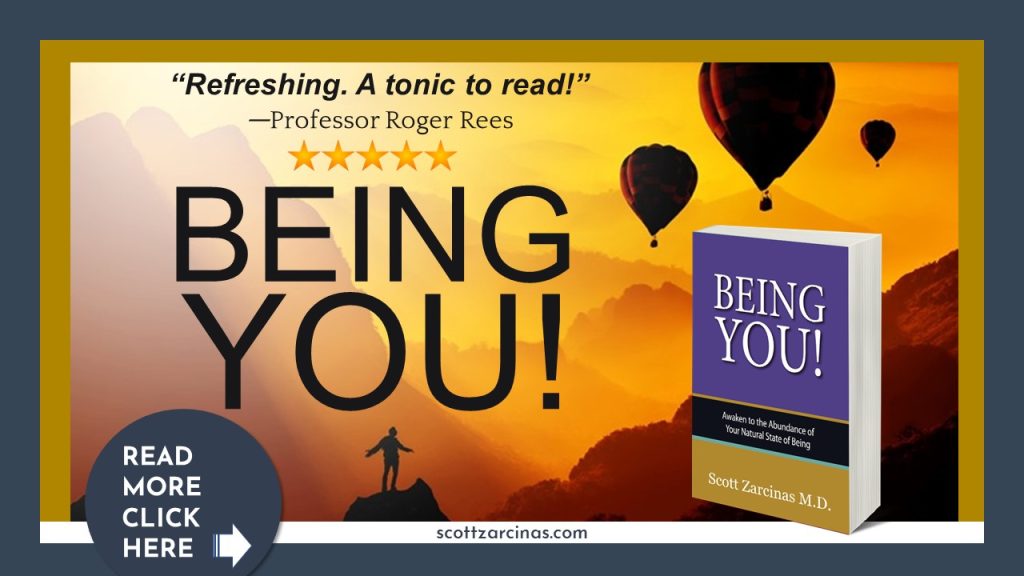
Cultivate Self-Approval: The Transformative Impact of Embracing Your Soul Identity
By Dr. Scott Zarcinas | Author, Doctor, Spiritual Coach
In a world that puts a lot of emphasis on external validation and instant likeability, the concept of self-approval might seem somewhat unconventional.
Yet, self-approval is a potent source of personal and spiritual empowerment that can transform our lives in significant ways.
Self-approval is in fact an essential building block of our mental, emotional and spiritual wellbeing.
When self-approval is rooted in the acceptance and approval of our soul identity, it forms the foundation on which our confidence, self-worth, and wellbeing are built, ultimately shaping how we perceive and interact with the world around us.
Self-approval is the act of recognising, acknowledging, and validating our soul identity—our real self—independently of external opinions, judgements, or validation.
This means embracing our soul identity as who we really are, focusing on our qualities and intrinsic value as a Divine spark.
This focus on our inner self and our connection to the Source of our being builds a positive self-image, reinforces our confidence, and boosts our sense of self-acceptance.
Self-approval is an essential component of our mental, physical, emotional, and spiritual wellbeing. When aligned with our soul identity, self-approval supports our capacity to trust our own judgements, decisions, and actions, freeing us from the relentless need for external validation.
Our soul identity is like an internal safehouse, a secure inner sanctum where we are free to be our authentic self, a place in which we can relax with total self-acceptance and independence from the opinions of others.
When we approve of our soul identity, we gain the inner confidence to face life’s challenges, build genuine connections, and pursue our dreams with unwavering belief in our purpose and abilities.
Self-approval through embracing our soul identity is therefore a cornerstone of a fulfilling and successful life. With it, we are empowered to lead a life that is true to our real selves and our own values, the life that we were meant to live.
Without it, however, we become inauthentic, needy, and full of self-doubt.
Approval-Seeking Behaviour
Self-approval, unfortunately, is a rare commodity. Especially the approval of our own soul identity.
Studies have shown that up to 85% of people worldwide, adults and adolescents, have issues with self-approval.
This means that every time you enter a place where people have gathered, whether socially or at work, only one in six of those people in that gathering has a strong sense of self-approval.
The remaining five out of six have a low sense of self-approval. From my experience, this is because most people with low self-approval ignore or deny their soul identity.
What happens when they ignore their soul identity is that they place undue focus on their physical looks or mental capabilities. They see themselves in the mirror or photographs and dislike the way they look, equating their outward appearance and form with who they are.
They then assume others don’t like them too. They start to make negative comparisons with others ‘better looking’ or ‘cleverer’ than they are. They become critical of themselves, they see themselves as weak and powerless, and all in all they are generally unhappy with the cards life has dealt them.
The issue with low self-approval is that it gives rise to a persistently pessimistic outlook that infiltrates our thought processes, which potentially drives self-destructive patterns of behaviour as well as a range of mental health concerns.
Low self-approval is, as researchers have shown, associated with a number of societal issues, including high dropout rates at school, violent behaviour, elevated suicide rates, teenage pregnancy, and academic underachievement.
Although these behaviours are the extreme consequences of low self-approval, it can still cause dysfunctional behaviour that limits our day-to-day wellbeing.
Fear & Need
Approval-seeking is a common human behaviour. It’s normal to want to be wanted. It’s normal to need to be needed.
But approval-seeking behaviour can become a problem when it interferes in your personal life or your work, when you constantly seek approval from others to validate yourself or to feel good about yourself.
There are many reasons why people seek approval, but its origins can often be sourced to two main causes: fear and need.
Fears and needs can arise when we are disconnected from our soul identity, when we ignore our connection to our real selves.
In my book, The Flea Circus, I discuss some of the common fears and needs that cause approval-seeking behaviour, which include:
-> Fear of looking foolish.
-> Fear of offering opinions/feelings/beliefs.
-> Fear of saying ‘No’.
-> Fear of hurting another’s feelings.
-> Need to belong/be accepted (fear of rejection).

The Need for Approval Seeking
But what is it that we are actually seeking when we seek the approval of others? What is it we are really looking for?
Approval seeking is a desire to be accepted for who we are because we lack self-acceptance.
This desire to be accepted is ultimately a spiritual desire to recognise and remember who you really are. It’s your inner self pulling your awareness back to your soul identity.
But this inward tug or pull usually gets mistaken as an emotional, mental, or social need, some of which include:
-
- Validation
- Conformity
- Feedback
- Confidence
- Comparison
- Emotional security
We seek the approval of others to appease this unrealised spiritual pull, thinking the answers to our needs are external to us.

#1: Validation
Approval from others often provides a sense of validation and belonging.
External validation reassures us that we are accepted and valued by those around us, that we are wanted, needed, and loved.
This can be a fundamental source of our emotional wellbeing if our approval seeking is met. When it isn’t met, it can be a source of mental and emotional dysfunction.
Validation of who you are can only come from within. External validation is always weak, temporary, and conditional.
#2: Conformity
Many cultures and societies place a strong emphasis on conformity and fitting in.
Individuals may seek approval from others to adhere to these social norms and avoid ostracism or criticism.
For many, what others think of us is very important. But too often it comes at the expense of our true selves.
It’s better to be disliked for who you are than to be liked for who you are not.

#3: Feedback
We learn from what we do well and from what we don’t do well.
External approval (or disapproval) provides feedback on our actions and behaviour, which we use to gauge our performance, make corrections, and adapt to our social environment.
This is important, but to rely solely on external feedback for your guidance is to ignore the guidance of your soul.
Intuition, insight, and inspiration are the ways your soul guides you. Ignoring its communication is to ignore your highest wisdom.
#4: Confidence
For some, external approval can boost our self-belief and confidence, especially when were are young.
Positive feedback from others can reinforce our sense of self-worth and encourage us to continue our efforts, especially as children.
However, to mature is to grow out of the need for external cues for confidence and self-belief. That’s what true adulthood is, to become self-sufficient and have self-determination.
True confidence arises from the faith in your unbroken connection to the Divine Source, your soul identity.

#5: Comparison
In competitive environments, we may seek external approval to compare and assess our standing in relation to others.
This can drive us to perform better or strive for excellence. Or it can cause us to give up and throw in the towel.
True competition is the competition with yourself, to be better today than yesterday, and to be better tomorrow than today.
#6: Emotional Security
Receiving approval and praise from others can provide a sense of emotional security.
It reduces feelings of vulnerability and inadequacy, promoting a sense of well-being.
But that’s only if you are surrounded by loving and emotionally caring people.
Emotional security flows from knowing your true self and the unshakeable sense of identity as a spiritual being.

Consequences of Low Self-Approval
Unfortunately, constant approval-seeking behaviour can get in the way of reaching your personal or professional goals, cause you to be less effective, and negatively affect your mental, physical, emotional, and spiritual wellbeing.
The problem with an over-reliance on external validation and approval is that only you can fill the void of low self-approval, nothing external can.
Any sense that it does is fleeting and short-lived, soon leaving you with that hollow sense of despair.
As adults, constantly seeking approval from others can have its downsides:
-
- Dependence.
- Anxiety and stress.
- Inauthenticity.
- Inhibition of creativity.
- Lower self-approval.
- Lost identity.
Let’s briefly discuss these downsides to low self-approval.
#1: Dependence
Over-reliance on external approval can lead to emotional dependence on others for your own self-identity and self-worth.
This can make you highly sensitive to criticism and unable to navigate adversity.
#2: Anxiety and Stress
The constant need for approval can lead to a heightened sense of anxiety and stress.
The fear of disapproval or criticism can be emotionally debilitating and mentally taxing.
#3: Inauthenticity
In your quest for external approval, you run the risk of compromising your authenticity.
If you adapt your behaviour and beliefs to match what you believe others want from you, your relationships will become superficial and fragile, and you will feel a deepening sense of emptiness.
#4: Inhibition of Creativity
Constant approval seeking can hinder your creativity and prevent risk-taking.
You may start to dismiss innovative or unconventional ideas or avoid taking action on these ideas for fear of disapproval or rejection.
#5: Lower Self-Approval
Paradoxically, constant approval-seeking behaviour can undermine your own self-approval and self-worth.
Over time, dependence on external validation and others’ opinions may cause you to question your intrinsic worth, soul identity, and abilities.
#6: Lost Identity
The more you seek approval from others, the further you will drift from your true self, your soul identity.
Once your identity becomes entangled with external approval, your real identity becomes obscured, forgotten, and suppressed.
You feel as though you don’t know who you are anymore. You have forgotten who you really are.

Self-Approval Benefits of Soul Identity
While external approval is important and can contribute positively to your life, it should be balanced with a strong sense of self-approval.
Achieving a healthy equilibrium between external validation and building self-approval is essential for your overall well-being and personal growth.
Ultimately, the foundation of self-approval is the acceptance and acknowledgement of your soul identity.
When self-approval is rooted in the truth of who you are, you will naturally maintain your authenticity, navigate challenges, and build positive, meaningful relationships.
Here are some of the benefits of prioritising self-approval through embracing your soul identity:
-
- Independent validation.
- Unwavering self-belief.
- Resilience.
- Positive self-identity.
- Authenticity.
- Empowerment.
- Positive relationships.

#1: Independent Validation
Your soul identity is an internal anchor that allows you to validate yourself without the need for anything external to you.
It means acknowledging your inner worth and significance without constantly seeking external approval or validation from other people or other things.
Acceptance of your soul identity liberates you from the ever-changing opinions and judgements of those around you, giving you a resolute sense of self-determination and complete control over your self-worth and identity.
#2: Unwavering Self-Belief
A core aspect of self-approval is the unwavering belief and inner conviction that you are deserving of love, respect, and success.
With a strong sense of your soul identity, you also have belief and trust in your own judgement and abilities, irrespective of external influences or challenges.
#3: Resilience
Those who prioritise soul identity are more resilient in the face of adversity than those who seek external approval.
Criticism and setbacks can be absorbed without damaging your self-belief and confidence.
Self-approval through soul identity also bolsters your capability and capacity to bounce back from life’s challenges, helping you maintain your wellbeing even in trying times.
#4: Positive Self-Identity
Soul identity forms the core of a positive self-identity, an internal source of healthy self-regard that transcends superficial markers of success, such as social status, wealth, possessions.
A positive and healthy self-identity empowers you to embrace challenges, make choices aligned with your values, and maintain a balanced and authentic self-image.
#5: Authenticity
Soul identity is intertwined with authenticity. It gives you the confidence to be true to yourself, embracing your wonderful uniqueness and soulful qualities.
With soul identity as the core of who you are, you don’t feel the need to conform or to mould yourself into someone you’re not to gain approval from others.
#6: Empowerment
Soul identity is inherently empowering. It gives you the courage to pursue your goals, dreams, and aspirations, even in the face of criticism or doubt from external sources.
Soul identity—knowing who you really are and why you’re here—fuels your confidence to venture into the unknown and take risks.
#7: Positive Relationships
With a healthy soul identity, you lay the foundation for positive, healthy relationships.
When you accept and love yourself for who you are, you become more capable of forming genuine connections with others.
Your relationships thrive because they become grounded in mutual respect and authenticity.









